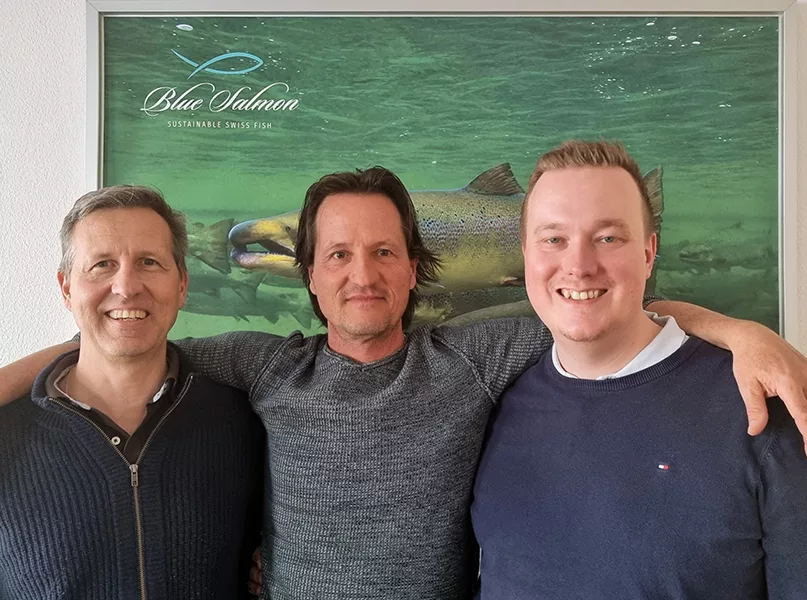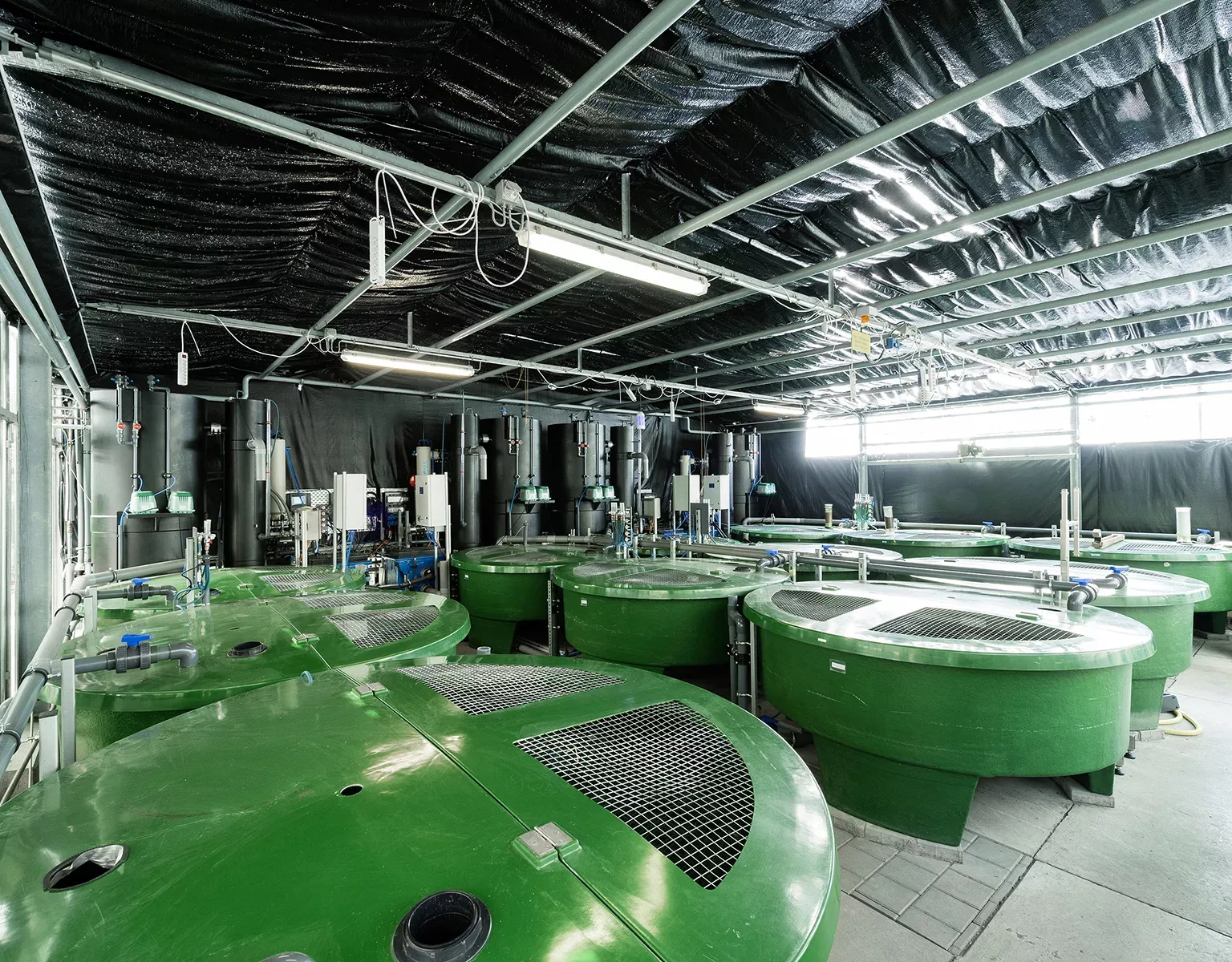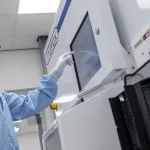Recirculating aquaculture systems (RAS) are reshaping the fish farming industry. Ruedi Ryf, CEO of Swiss Blue Salmon, tells us about the company’s plans for the world’s smartest land-based RAS fish farm.
SMART AQUACULTURE IN THE ALPS
Pollution and unsustainable fishing practices mean that there will soon be more plastic in the sea than fish.
Rapid acidification is also killing corals and sea life in general, leading to a chain reaction of damage that is threatening food and economic security, trends that are likely to be further exacerbated by climate change.
Aquaculture, the practice of fish and seafood farming, has helped to alleviate such pressures and is currently one of the fastest-growing food production systems in the world.
At the forefront of sustainable aquaculture is Swiss Blue Salmon (SBS), who believes the practice will play a critical role in protecting wild fish populations as the global population, which is projected to hit 9.7 billion by 2050, and demand for seafood continues to rise.
“Switzerland has high growth in the aquaculture sector, with production doubling over the last 10 years,” states Ruedi Ryf, a passionate fly fisherman and the CEO of SBS.
Founded as recently as 2020, SBS wants to become a leading seafood company known for its high levels of animal welfare and minimal environmental footprint, and advocates land-based recirculating aquaculture systems (RAS) as the best way to raise healthy, sustainable, and premium quality fish.
“Today, salmon is mostly farmed in sea cages in the ocean, resulting in several environmental problems. In Switzerland, the farming of fish in sea cages is illegal because we have very strict water discharge guidelines,” Ryf explains.
“I’m not against this traditional way of farming fish, but further growth of the salmon market needs to happen in land-based RAS.”
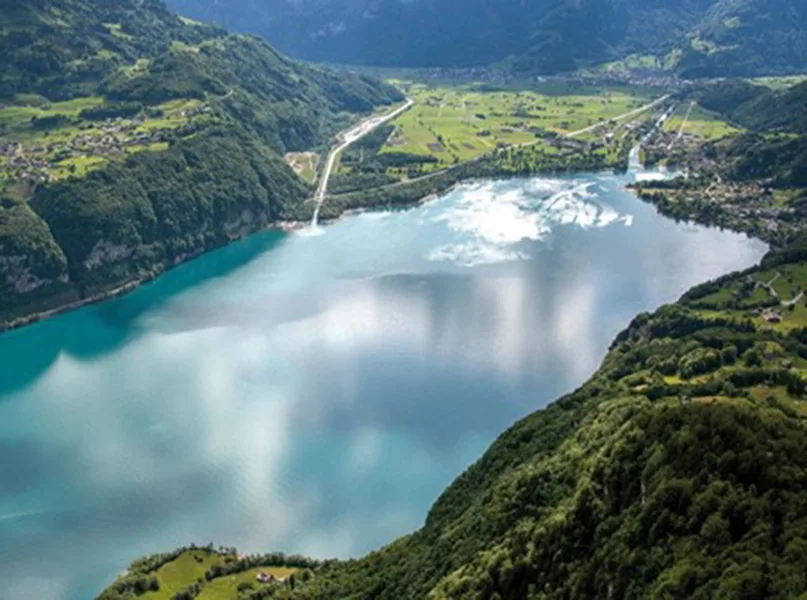
RESHAPING THE INDUSTRY
Securing an adequate food supply is one of the greatest global challenges currently facing humanity, and land-based aquaculture holds significant promise for the planet and its people.
The world’s most advanced, sustainable aquaculture method, RAS is said to be disrupting and reshaping the world’s fish farming industry.
The system recycles water through cutting-edge filtration technology and oxygenation systems, reducing water consumption to a minimum, and uses filtered-out residues as valued by-products within a circular waste management approach.
“RAS technology enables us to clean the water before it’s discharged into the watershed, and produce healthy fish with a truly small eco-footprint to help protect the oceans,” elaborates Ryf.
“Due to the high treatment of water, we extract more than 95 percent of common wastewater constituents and make them available for other uses such as biogas production and agricultural phosphorus fertiliser.”
RAS has already been implemented in Switzerland by Basis 57 Nachhaltige Wassernutzung AG, who produces pikeperch in water drained from the 57 kilometre (km) Gotthard Base Tunnel that runs through the Swiss Alps, and Swiss Lachs, who established the very first RAS salmon project in the country.
As premium quality and healthy fish depend on perfect water conditions, raising fish in a land-based RAS farm provides the optimal operational water quality “window” where their physiological needs are met, and where the product produced is of the optimum quality.
After conducting feasibility studies for several sites across Switzerland, SBS has been able to secure a 27,000 square metre (sqm) site in the alpine canton of Glarus to build a land-based RAS salmon farm. Vertically integrated from hatchery to grow-out, the fish will be reared in the purest Swiss alpine water, free from antibiotics, pesticides, hormones and microplastics.
SBS is now in the design and permitting phase of the state of the art project, which has the capacity to grow 3,400 tonnes per annum (t/a) of Atlantic salmon (salmo salar) with room to expand to an impressive 12,000 t/a.
“We have evaluated many construction sites and chosen the one where we can produce with the lowest environmental impact,” Ryf outlines.
The RAS farm site is conveniently located close to road and rail links nearby Switzerland’s largest city, Zurich, and neighbours Lake Walen, which has enormous potential for a sustainable and efficient energy setup.
“SBS gets free cooling from the mountain lake, access to clean water, exposure to solar power, and good logistical access. Goods can be transported by train and truck, and Switzerland has a very high proportion of relatively cheap green energy from hydropower,” adds Ryf.
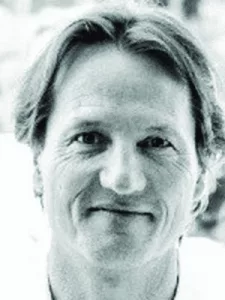
“We have evaluated many construction sites and chosen the one where we can produce with the lowest environmental impact”
Ruedi Ryf, CEO, Swiss Blue Salmon
SUSTAINABLE SALMON
When looking into how to best build the land-based RAS fish farm, healthy fish and healthy employees were an important starting point for the company.
Both are key to the economic, environmental and social sustainability of an aquaculture business such as SBS, whose minimal handling and far lower stocking densities compared to other projects ensure the well-being of the fish and reduce operational risks.
It also enables better feed conversion and leads to the sustainable use of resources for fish feed, which is one of several key pillars of a sustainable RAS project.
“RAS projects only have the chance to be sustainable if they fulfil five aspects: very low emissions through wastewater treatment, energy efficient design, operating with green electricity, sustainable construction, and sustainable feed resources,” Ryf notes.
“Environmental sustainability is at the core of our DNA. Our USP is that our salmon has the lowest ecological footprint possible, and it’s the consumer’s choice if they want to do good for the environment.”
Conscious consumers are typically prepared to pay a big premium for locally and sustainably produced fish, and SBS plans to fill what is a sizable gap in the market for socially responsible Swiss salmon.
Indeed, local Swiss aquaculture only accounts for around two to three percent of fish consumption in Switzerland, the rest being imported products with a high environmental footprint, shorter shelf life, and consequently lower quality.
“There is a high demand for Swiss fish, and the main difference is that our product is local, whereas our competitors are importing their fish from Alaska, the Netherlands or Norway, resulting in increased CO2 emissions,” Ryf tells us.
“Our products have a lower environmental footprint than the competition because we invest in renewable energy, smart and efficient infrastructure, and we have a strong focus on innovation to improve the environmental performance of RAS.”
SBS started out with four products – head-on gutted salmon, fresh salmon fillets, and two smoked products – all processed by the company, with just smoking outsourced.
“We plan to sell over 90 percent of our products through retail and fish distributors, with the rest being directly sold via our farm shop, online store, and a few collaborations with Michelin and Gault Millau chefs to obtain high visibility in food-related articles and media,” informs Ryf.
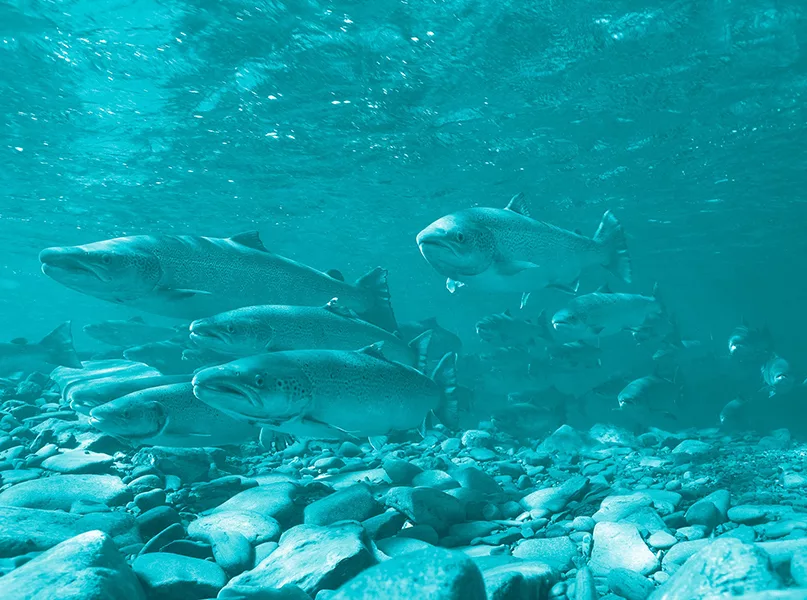
SMART FISH FARMING
Together with technological partners, including the Zurich University of Applied Sciences (ZHAW) and ReelData AI, SBS’ land-based RAS fish farm aims to be the world’s smartest, using advanced technologies like artificial intelligence (AI) and machine learning (ML).
SBS strongly believes that smart RAS farming will lay the foundations for a sustainable and efficient way to produce healthy fish.
“We’re looking to bring in learnings from other industries while incorporating revolutionary AI and ML technologies already in the market, such as an autonomous feeding system and biomass monitoring,” Ryf says.
Today, the aquaculture industry is undergoing a significant operational shift as fish farms are transformed into sophisticated sensor hubs that generate valuable data and connect through the web.
Digitally driven condition-based maintenance results in improved reliability by continuously assessing the condition of fish farm installation.
The objective is to identify potential issues before they become major problems, and take proactive measures to prevent failures and unplanned downtime.
“Digital asset management can help to improve efficiency and reduce operational costs. For example, by identifying equipment that needs maintenance or replacing, fish farmers can avoid costly breakdowns and reduce downtime,” details Ryf.
“The data collected on our farm will be available to strategic partners within both the industry and academia. Becoming an integral part of the “wheel of innovation” is our vision.”
TEAM EFFORT
RAS grow-out facilities are challenging projects that require the cooperation of both strong local and international partners, to ensure all angles are covered from start to finish.
SBS has therefore spent a lot of time assessing and selecting partners that it believes are necessary for success, such as the Swiss engineering company Holinger, whose team of 500 highly skilled engineers bring essential expertise in water quality, wastewater treatment, heating and cooling systems, and Switzerland’s leading construction company, Erne, who comes with expertise in building.
“Everybody at Holinger and Erne is fully dedicated and wants to help us design and build the smartest farm in the world,” Ryf affirms.
External partners such as Holinger and Erne are supported by SBS’ strong in-house team as well as a couple of highly skilled subject matter experts.
“Ultimately, this is a team effort and that cannot be underestimated due to the complex nature of our projects.”
Once the farm is operational, SBS will be up to around 50 employees, with the company currently looking to recruit a Chief Operations Officer (COO) to oversee all operations and ensure the team works towards achieving their goals.
“We want to onboard our COO early and involve him in the design and construction process of the farm, to gain valuable inputs from an operational perspective. Basically, this person will help us design the farm and also run it later on,” shares Ryf.
Concurrently, SBS is focused on obtaining the building permit along with other relevant environmental and operational permits.
It follows plenty of stakeholder engagement over the last two years, as the company met with people about the project and outlined what it would like to achieve.
“It’s key to engage early and talk to the community. There has been strong support from the local community to date, and we’re looking forward to working with them on the details linked to this process,” Ryf concludes.
On course to commence construction in Q2 2024, yielding SBS’ first harvest in 2027, SBS’ land-based RAS is the future of sustainable Swiss salmon.
